Helping Horses: NC State Hosts Training on Handling, Assessing Animals in Potential Danger
The all-day event, organized by the Humane Society of the United States with the NC State College of Veterinary Medicine and the Raleigh Police Department as partners, drew more than 30 officers from across North Carolina.
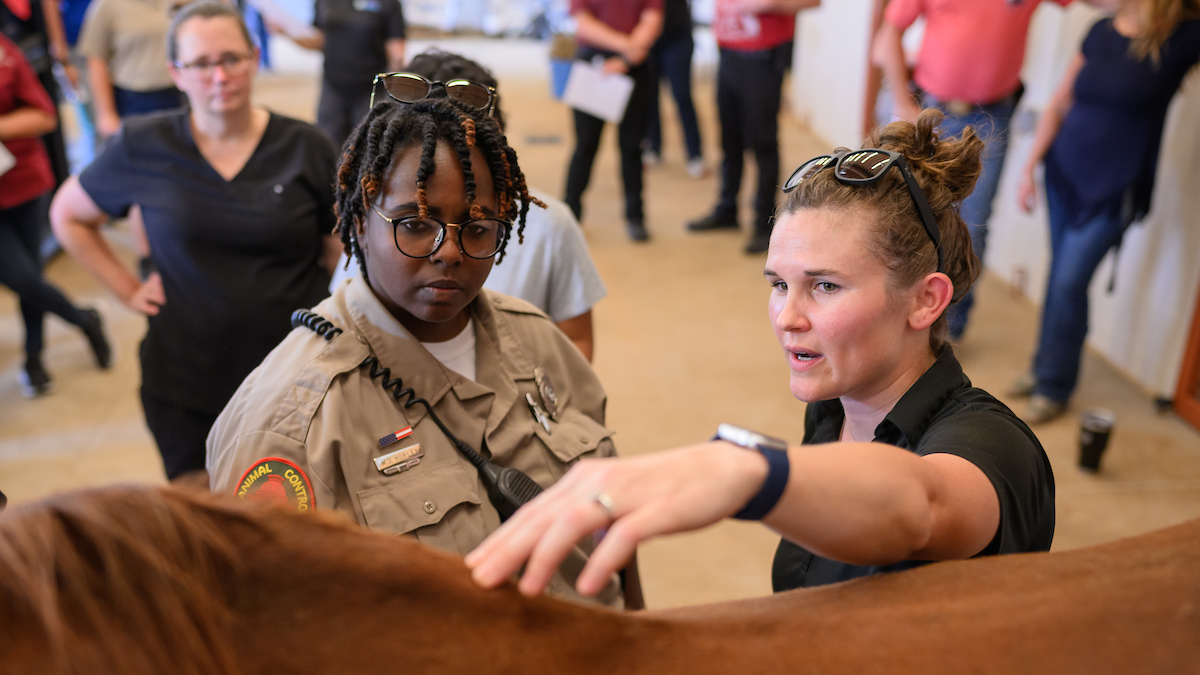
As a sergeant for Cumberland County Animal Services, Christy Barber gets three or four calls a month from residents wanting her to check on haggard-looking horses, a number she says has been ticking up over the past couple years.
“We’re starting to get more cases, and I attribute it to the economy,” said Barber, a 15-year veteran of the agency and the only officer on staff who investigates equine and large animal abuse cases. “A lot of people have this mentality, ‘Oh, I always wanted a horse because I think they’re pretty,’ and they know absolutely nothing, and they jump in way over their head. People now can’t afford the horses they have.”
When Barber saw that the NC State College of Veterinary Medicine and Reedy Creek Equine Farm were hosting an event last week to train law enforcement and animal control officers on identifying and handling equine abuse, she immediately signed up and drafted seven staff members as well.
The all-day training, organized by the Humane Society of the United States with NC State and the Raleigh Police Department as partners, drew more than 30 officers from across North Carolina. Joining the Cumberland County contingent were representatives from Raleigh and Anson, Chatham, Guilford, Johnston, Lenoir, Mecklenburg, Mitchell and Wake counties, among other places.
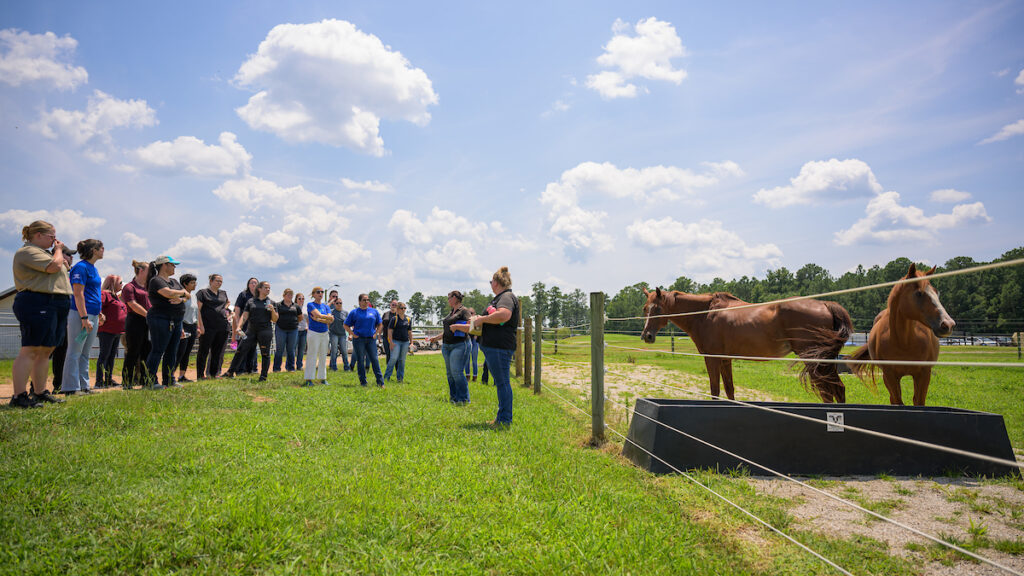
The event included presentations by Humane Society experts in a lecture hall on the College of Veterinary Medicine’s campus and hands-on learning with NC State equine experts and horses at NC State’s Reedy Creek Equine Farm.
“We are pulling from a lot of the state, which is really great,” said Gail Thomssen, the North Carolina state director of the Humane Society. “Raleigh is a great location, and the vet school is phenomenal, and that people are willing to drive in for this event says a lot about how much it was needed.”
Numerous agencies had asked Thomssen when the Humane Society, which offers seminars on feline and canine abuse, could hold similar training on how to assess and handle horses. North Carolina is home to more than 250,000 horses, with the equine industry adding $2 billion to the state’s economy each year.
“Officers see equine cruelty, and they don’t have the knowledge to investigate or know what questions to ask, what they should be looking for and how to apply the laws,” Thomssen said, pointing to a recent case in Davie County as an example of what can happen in North Carolina. “They don’t know the standards of care, the feed, what horses should have, and they want to.”
Here for the community
Thomssen was riding her bicycle along the Reedy Creek trail in Raleigh when she saw a sign for NC State’s Reedy Creek Equine Farm. She started wondering whether the NC State would be interested in providing the space, the horses and some extra expertise to train officers in horse handling.
A couple of emails and calls later, she had her answer: NC State would love to help.
“It’s wonderful because that’s what we want, for the community to feel that we are here to help them,” said Dr. Kate Meurs, dean of the NC State College of Veterinary Medicine. “We’ve made it one of the goals of our strategic plan to be even stronger partners and expand our relationship with shelters, with public service organizations, with any group that might need our expertise or that might offer opportunities for our own trainees.”
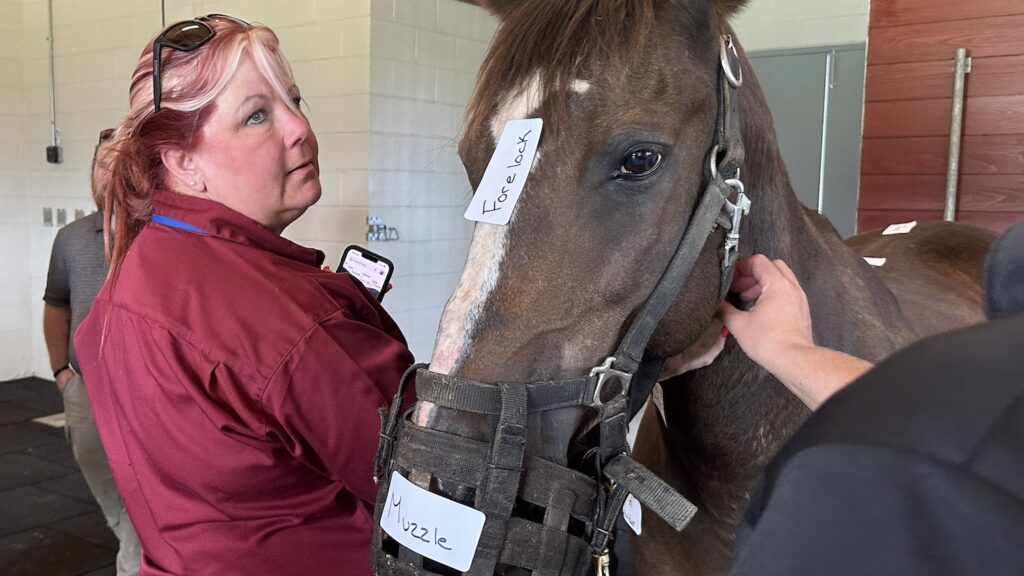
At last week’s event, Humane Society experts shared information on how to identify health concerns and common conditions in horses and how to document critical evidence, prepare for investigating cases and interpret laws as they relate to equine cases.
In the afternoon, attendees moved to the horse farm, where NC State equine experts including Dr. Allison West demonstrated general horse behaviors and herd dynamics at feeding time to show the importance of safe equipment and ample space. Participants learned how to halter and lead a horse, to catch and lead in emergency situations and to identify basic equine anatomy.
“It’s so helpful to have these sorts of relationships ahead of time instead of waiting until something happens, when it’s not, ‘We need a vet now!’” said West, who is the clinical veterinarian in charge of animal care at the NC State Reedy Creek Equine Farm. “We can get ahead of some of it by doing hands-on learning now.”
Attendees also learned how to assess body condition by scoring the degrees of fat covering a horse’s body, which is a good indicator of the animal’s health status. To score a horse, investigators evaluate six body areas from neck to tail, assigning numbers from 1, where no fatty tissue can be felt, to 9, where bulging fat is evident, West said. An overall score is then calculated from the average.
West shared with the officers how to tell whether a horse is in immediate or no danger and everything in between. Maybe a horse could use some weight, but it recently had a foal or it works six days a week, she said. Maybe owners don’t understand that an average horse drinks 30 gallons of water a day or that it won’t touch food that’s the least bit moldy because horses can’t vomit.
“There’s a real need for law enforcement to be trained because not everybody has the best intentions,” West said. “We’re teaching them how to assess these horses and how to help owners. Sometimes it’s not willful. They just don’t know: ‘Does the horse need medical care? Or does the owner need education?’ It’s not all doom and gloom. Sometimes we’re helping them help people.”
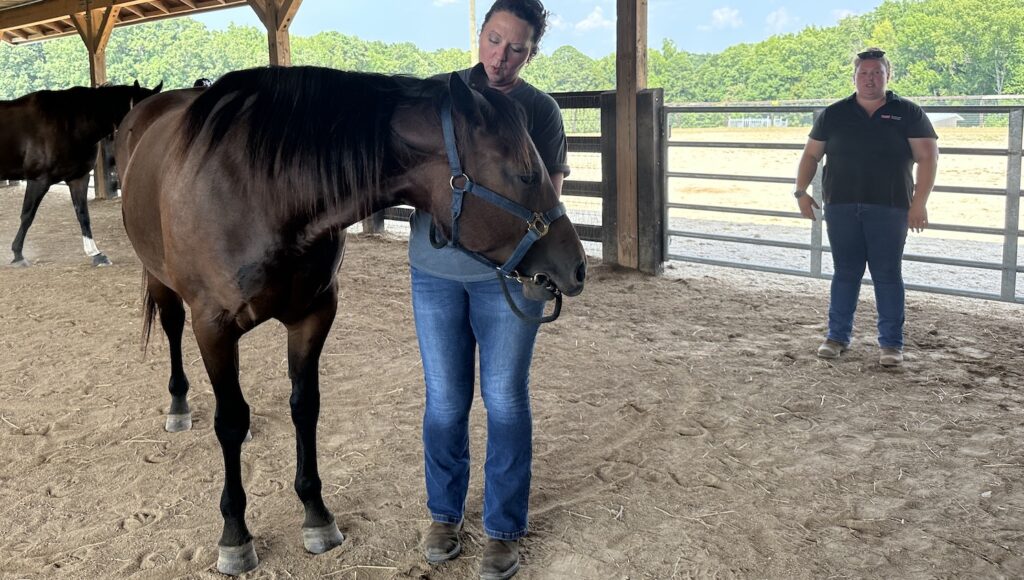
‘I’m all about learning’
West and the equine staff encouraged the officers to get hands-on with the horses by feeling them and labeling the docile animals’ anatomy with sticky notes. A trainer later said the latter exercise was designed to let the officers get accustomed to being close to what can be unpredictable animals.
“I’m glad we got to do that,” said Ciara Reband, an officer with the Cumberland County Animal Services. “It was intimidating for me.”
Maya Hurley with Capital City Animal Control, a division of the Raleigh Police Department, was one of the first to volunteer in every exercise that involved touching the horses.
“I don’t have much experience with horses, so I was hoping to learn the basics for what is healthy versus what is not healthy, what to look for and how to educate more people about it,” she said. “We don’t run into a lot of horses in the city. That’s more the county’s department, but it’s still information I need and want to have.”
Even with her experience assessing large animals in Cumberland County, Barber said she was eager to see what she could take away from the training.
“I’m all about learning,” she said as her square-toed boots churned up the rocks on a path through the Reedy Creek Equine Farm. “Every person and every organization does something different. Some of our folks have never laid hands on a horse so this is good training for them. And the more we can do for them, the better we can serve our community.”
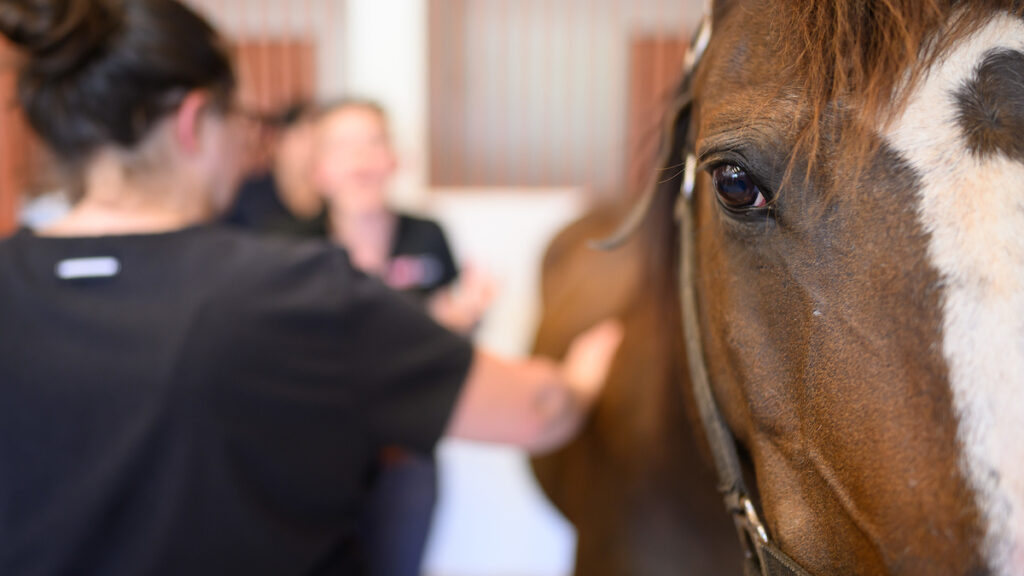
- Categories:


